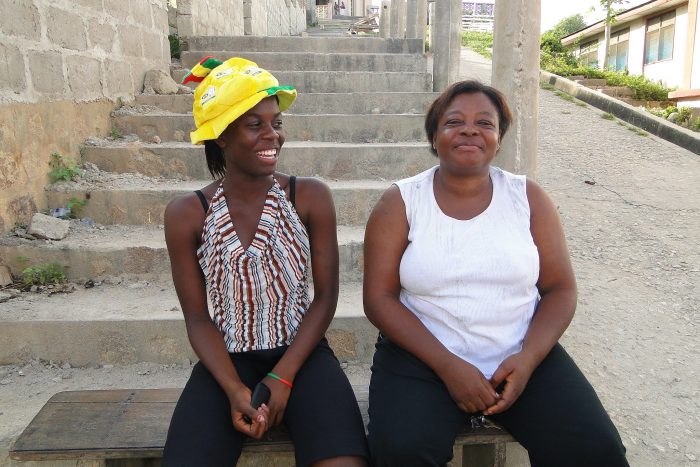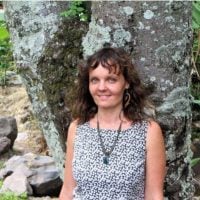I spent a year teaching the children of the wealthy in Accra, the capital city of Ghana.
It was a harsh contrast of lifestyles—I would walk past the run-down shanty towns with hungry, naked children every day, to teach the wealthier children who spent their summers in Europe and the United States.
I learned more about my privilege than ever before.
I lived in a tall apartment building that once was white, but had turned rusty brown from the arid dust. Every Saturday, the women in my building would gather in the courtyard and wash the laundry. They would go to work all week, and spend all Sunday at church, but on Saturday, they would wash.
And how they would wash. Every individual item they would scrub, every inch and corner, over and over and over again. They would rinse and squeeze it all out. And, just to be sure, they would do the whole process a couple more times—just to make certain they’d really cleaned it properly. It took all day.
I am a pretty seasoned backpacker, and I’m no stranger to hand-washing. But my hand-washing was a pretty quick soap and rinse to make my clothes passable.
They were half appalled, half amused when they saw how I tried to rush through my hand-washing the first Saturday I joined them. I had different priorities; after a full week of work, I wanted to get my chores done quickly so I could head to the beach.
“No, no!” they would chuckle at me. “Don’t you know, your clothes aren’t even half clean when you do like that? Here!” And they would show me how to scrub and scrub and squeeze and scrub some more.
Well, I’d just signed a year’s contract on my apartment, and I had no intention of spending every Saturday washing my clothes to within an inch of their life. So I started washing my clothes on Sunday. While everyone else in my building went to church, I would sit in the courtyard, solo, and rush through my laundry, leaving me the rest of the weekend free. I would head to the beach or walk and explore. I met with new friends, I headed to bars. And the women in my apartment would gather and wash.
Sometimes I would pop by and say hello and we would chat a little before I headed out. “You know, we don’t wash all day because we have to,” Adwao, a mother of three and fellow teacher at my school, told me one Saturday. “We thought about pooling together and buying a machine for the building, we could have afforded it.”
“So why didn’t you?” I asked.
“We like to use our hands to do our work. We like to feel the soap and the cloth and the water. We like to know our children and husbands will look clean and smart at church and school because we scrubbed their clothes.”
And I watched, with new eyes, how they scrubbed their families’ clothes; I watched the love and diligence they poured into every item; I watched the shrewd eyes that examined every stain and tear that told stories of playtime scuffles and adventures.
And I watched how they paused—to enjoy their time, to laugh at each other’s jokes, watch their children play together, to share their stories.
I watched with a little envy, through the eyes of a long-term solo traveller, how they shared looks and nods to stories past, bonds forged over a lifetime of friendships together. And I saw the beauty in slowing down.
I thought of my own life, of my recent years darting from one end of the globe to another. Wonderful adventures sure, but many, many lonely nights, and returning home to conversations with estranged friends and family. I thought of the lives of friends back home. Of the life I used to lead in London. Of rushing to and fro, of solo evenings and commutes staring at screens. Of nights of alcohol-fuelled, surface level conversations. Of palpable loneliness contracting through a whole city. Maybe even a whole country.
“A machine can’t do that,” Adwoa concluded. And I ached for the life I hadn’t known.
And that day, I joined them. I heard stories of hardship, poverty, and grief that were beyond my worlds of experience. I heard stories of mirth that made me giggle ‘til it hurt.
We had moments of silence where I experienced the textures of my clothes against the soap and the cool water, one of my first dives into mindfulness.
I played with the children, and I belly laughed.
After we hung our clothes under the hot African sun, we gathered and cooked dinner together. Another affair that took much longer than expected. We chopped, and paused to laugh and talk, taking our time to look at each other, before returning to our chopping.
My experience of living in Ghana changed. I slowed down. I started to take my time. I learned how rushing from experience to experience had cost me something: Presence. Connection.
I still had my restless wanderer spirit, but I started to change the way I travelled. I stopped rushing from place to place so much, looking for wonder and adventure. I spent more and more time in quiet spots in nature, getting to know the feel of the land beneath my feet, the air against my skin, looking into the faces of the people I met, listening to their stories.
I felt less and less drawn to explore new spots. I discovered more and more wonders in the same places.
And I never viewed laundry in the same way, again.
And in this time of uncertainty, of enforced stillness and slowness, I give thanks to my old neighbours, these women, for their teaching me the value of slowing down and staying still and appreciating what we have. And I pray we all find the gifts, the lessons within these unprecedented times.


 Share on bsky
Share on bsky





Read 2 comments and reply